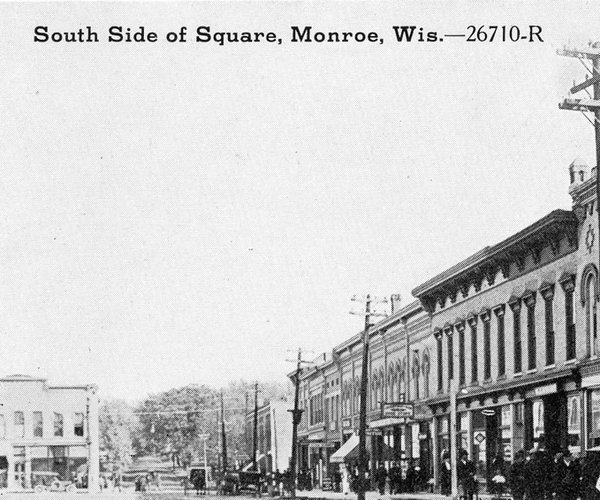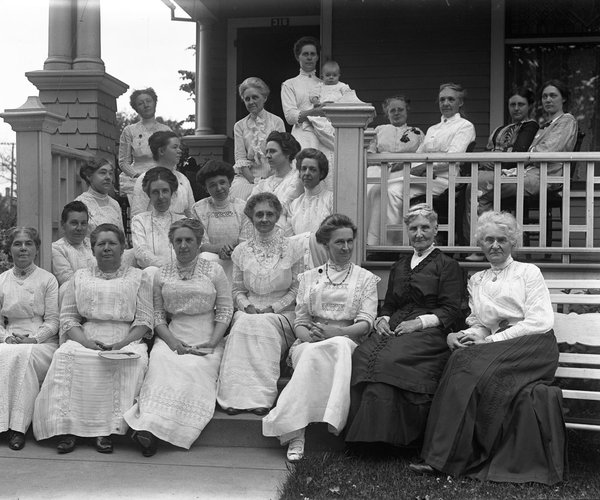A few years ago when I was working at Sequels on the southeast corner of the square, an elderly lady came into the store to consign some old bottles from the Monroe Bottling Works. Sequels was not an antique store so I told her we couldn’t consign those, but I did offer to buy them from her and have held onto them for some reason. I’m not sure what I’m going to do with them, but today I want to share information with you about the long history of that company and its owners.
The Monroe Bottling Works got its start in Monroe in the 1870s, but first we’re going to explore its founder, Edward Einbeck. He was born on September 8, 1837 in Frankfurt Germany; it is unknown when he came to the United States. At the age of 23, the 1860 census lists him in a boarding house or hotel in Mineral Point, Wisconsin; at that time he had personal property valued at $1,000. He was married to Kathinka Zinndorf on September 20, 1863. By 1870, the couple was living in Milwaukee with their three children, Edward, 4, Kathinka, 2, and Charles, 9 months. Edward was an “agent of pure materials” and had $600 in personal property. Charles’ obituary said that he came to Monroe with his family in 1871.
The first reference I found in the newspaper was on April 17, 1872 when he and John Disch were brought before Justice Cook on a case under the Graham Law. The wife of Bill Jones brought the case “for damages, resulting from the sale of intoxicating liquors to her husband.” Bill was a hard worker when he was not filled with alcohol; it was said that he could “maul more rails than any two common men. When drunk, he is ugly and takes his wife for a rail and begins mauling her rail hard. The Graham Law is calculated to protect all such as she.”
Edward petitioned the Village Council in October of that year for a license to sell intoxicating liquors and drinks. His petition was signed “by two good and sufficient sureties,” so was approved by the council. Upon payment of $25 he was allowed to sell intoxicating liquors in the village until May 10, 1873. The Sentinel shared on October 30 that Einbeck had rented the American House (southwest corner of the Square) to open a saloon. At the regular meeting of the Village Board on August 21, 1874 they allowed him “to put a bowling alley in the Old American House, provided he put $30.00 into the Village Treasury.” It was announced on April 28, 1875 that Einbeck had rented the former location of Mrs. A. W. Potter’s millinery store where he planned to operate a wholesale and retail liquor store.
It was reported on January 12, 1876, “Edward Einbeck, the saloon king of Green County, is making preparations to manufacture extensively, next spring and summer, a superior quality of bottled soda-water.” By March, he had leased the rooms that were occupied by H. Dockham’s Jewelry Store starting on April 1. He planned to open “a temperance billiard hall,” and stock cigars, nuts, candies, soda-water, (pop), lemonade, sweet cider,” and more.


Edward must have been an industrious man as he was making extensive preparation for manufacturing bottled soda-water by the end of April. “A nice new wagon for delivering is being made by Patterson & Billings.” A thank you message was printed on May 3 from the Sentinel office for a couple dozen bottles of soda water that Einbeck had delivered to them. It was unanimously pronounced the best pop ever offered for sale in this locality and is a convenient and delicious beverage.” Einbeck intended to manufacture large quantities that season and supply the trade and parties at a liberal discount. Orders from the country were to be promptly filled.
An article in the July 25 issue of the Sentinel stated, “There are eight or nine places in Monroe, where liquors have heretofore been sold by the drink and quantity, which have been closed up, their owners having concluded to quit.” A second article said that Einbeck and two or three other saloon proprietors “have been summoned to appear before the bar of justice, and answer to the charge of selling intoxicating drink without license.”
A year later on August 1, 1877 Einbeck was thanked again for a couple dozen bottles of the celebrated pop made at his factory on Jackson Street. The printers were “unanimously of the opinion that Mr. Einbeck has made great improvement in this article, and it is certainly the best pop ever sold in Monroe. Since Einbeck started his factory last summer, he has worked up a large business in the sale of this beverage and the quality of article is recommending it so highly that he has a constantly increasing demand. Nothing but pure and harmless articles are used in its manufacture, and particular care is taken to cleanse the bottles.”
In June 1878 Einbeck “removed his soda-water and New York root beer factory to [the] east side of the square in his old time liquor store.” Two months later, on August 21, “Ed Einbeck was pulled, on complaint of a man whose front and rear name is McPhillips, one day last week, for selling liquor without license. Mc had the misfortune to get into one of Sheriff Studley’s rooms, at his hotel, and Einbeck wouldn’t advance the money to bail me out. Nothing came of it.” The following month, the editor printed, “Who is it that insists on persecuting Ed. Einbeck? Can’t you let him alone? Must he be singled out from all the liquor dealers who violate the laws, and be brought into court and strapped of his money?”
It was announced on October 9 that the village board had “finally granted license to Ed. Einbeck. Both mutually agreeing that it was better to license than to fight it out. Such is life.”
Would that be the end of Edward Einbeck’s troubles with the Village Board? There will be more about him and the founding of the Monroe Bottling Works in the next two columns.
— Matt Figi is a Monroe resident and a local historian. His column will appear periodically on Saturdays in the Times. He can be reached at mfigi48@tds.net or at 608-325-6503.





